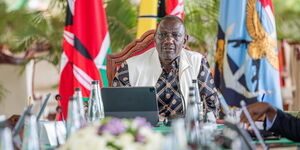The United Nations Environment Programme (UNEP) and the Food and Agriculture Organisation of the UN (FAO) have announced seven restoration projects set to benefit Kenya and other global nations.
In the Tuesday, February 13, announcement, the UN noted that these projects aim to restore degraded habitats, including areas negatively affected by wildfires, drought, pollution and deforestation.
Further, through this project, the UN seeks to prevent, halt and reverse the depletion of marine and terrestrial life.
Kenya will be part of the Regreening Africa project which aims at restoring 5 million hectares by 2030. Other countries on this project include Ethiopia, Ghana, Mali, Niger, Rwanda, Senegal and Somalia.
This project is estimated to cost about Ksh9.3 billion (USD60 million) within the stipulated timeline. Additionally, the seven projects are expected to create about 500,000 jobs.
Additionally, this initiative is anticipated to benefit over 600,000 households, enhancing carbon storage, boosting crop and grass yields, bolstering soil resilience and treating it with fixed nitrogen - a natural fertilizer.
Kenya will also be part of 'The Forest Garden Program'. This seeks to restore 229,000 hectares by 2030.
Other projects include- The Restoring Mediterranean Forests Initiative, The Living Indus Initiative, The Acción Andina, The Sri Lanka Mangrove Regeneration Initiative, and The Terai Arc Landscape Initiative.
If successful, the seven projects will also result in the restoration of about 40 million hectares of degraded habitats.
According to the UN, the Regreening Africa Project was informed by the fact that about 45 per cent of Africa's land is affected by desertification.
"Over half of productive lands in Africa are degraded, with climate change exacerbating this challenge. The good news is restoration works and can bring major benefits to communities – from supporting smallholder farmers to helping raise household incomes," Inger Andersen, Executive Director of the UN Environment Program remarked.
During the announcement, Andersen noted that these efforts were geared toward restoring the degraded ecosystem which was affected as nations strived for economic development.
Andersen emphasised it was not too late to reverse the effects however, he added it would require double the efforts.
On the other hand, FAO Director-General QU Dongyu added that restoring terrestrial and aquatic ecosystems was key in the transformation of global agrifood systems to be more efficient, inclusive, resilient and sustainable.
"Ecosystem restoration is a long-term solution in the move to eradicate poverty, hunger and malnutrition, as we face population growth and increased need for foods and ecosystem goods and services," he stated.
This announcement was made ahead of the sixth session of the UN Environment Assembly (UNEA-6) scheduled from February 26 to March 1 at the UNEP headquarters in Nairobi. UNEA is the world's highest-level decision-making body on matters of environment.
Besides Africa, other areas selected for the projects include Latin America, the Mediterranean and South Asia.












